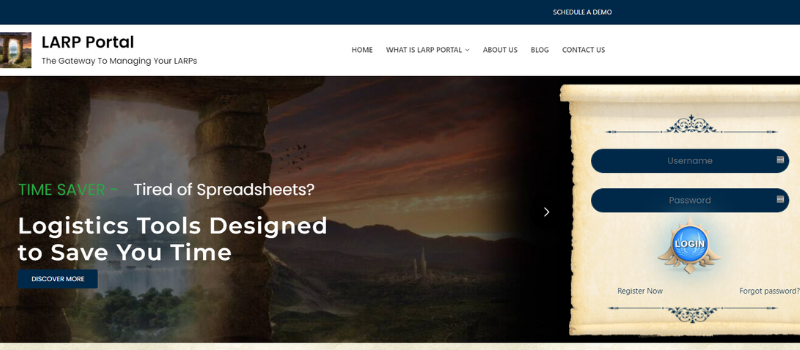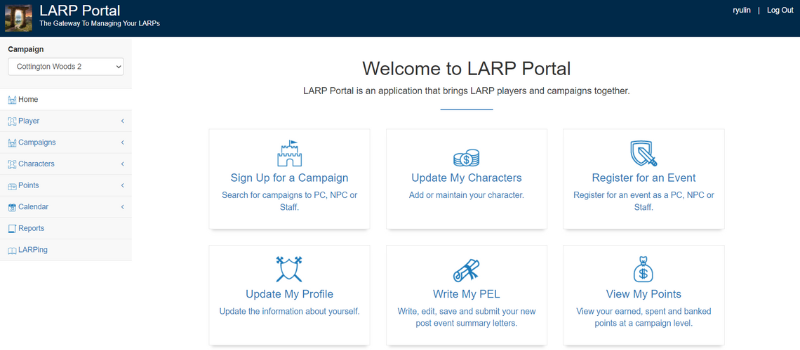What is LARP Portal?

How an Online Tool Is Saving Live Action Role Players More Time To Write Plot
Let’s face it, running a LARP is time consuming. In all but the rarest of occasions, it’s probably done in addition to holding down a full time job and managing family obligations. Once your initial game LARP rules and policies are established there are endless administrative tasks associated with running the events that can consume endless hours of precious time that you and your staff would rather spend writing plot for your events.
In this post we will share how LARP Portal has been designed by LARPers for LARPers to streamline all of the most common game logistics to save not only time for your staff but also for your players. LARP Portal integrates all common logistics into a modular multi-game LARP system that simplifies the PC, NPC and Staff experience by providing a centralized tool where players self-manage their characters and staff plan and run events.
How LARP Portal Saves You Time?

Over the years I have PC’d, NPC’d and Staffed many Medieval LARP and Fantasy LARP games and I used to dream of a system that would eliminate all spreadsheets and manual repetitive processes. I could see the data tables in my head and just knew how it would eliminate the “Matthew”, “Mathew”, ”Matt”, ”Mat” data matching issues we all experience when using spreadsheets. I knew that if the player was added once and was tied to every game, event, registration, character etc. in a relational database, game logistics could be so much easier.
We Know Not Every LARP Has a Database Engineer on Staff

I knew we needed a tool that would replace the need for games to have a resident database administrator. LARP Portal was designed to meet this need. During Implementation we partner with you to add your character rules or skills through a series of easy steps. We provide full system support to your staff and are the front-line support for your players too. Our goal is to free you up to spend less time on logistics and more time on plot.
Players and Staff Can Manage LARP Event Registration

Players manage their own event registrations with the ability to tell staff if they are coming for the entire event or for a partial event, if they have housing preferences, food preferences and what game they would like the points assigned to if they’re NPCing. The system also collects an RSVP prior to event registration being opened. This feature is a customer favorite as it gives staff insight into who is able to attend and not attend for plot planning purposes. Players can also cancel a registration. Based on the rules a LARP has established - all rules are configurable- the player will know if a refund can be expected or if a credit will be applied.
Knowing how many PCs, NPC and Staff are coming to an event is as easy as running a registration report that is up to date to the moment based on registrations. The registration data is then used to automatically feed other related functionality like housing assignment and event point assignment.
The integration of data is key to saving time on administrative functions. The ability to have accurate data is also a time saver. That’s why Staff with the correct system role also have the ability to add, change and cancel a player’s registration.
Players Make and Update Their Own LARP Characters

LARP Portal’s Character module allows the Player to not only build a character by selecting skills from a rules engine, but to fully develop and describe their character in-game specific terms and to itemize aspects from their history making it easier for plot staff to view, search and integrate into plot. The character is created and updated by the Player but staff also has access and ability to make updates that may be restricted to the player.
Key Character Features That Save Staff Time:
 Players manage forming and joining a team which can be for in game reasons or used for housing.
Players manage forming and joining a team which can be for in game reasons or used for housing.
 Players self manage requests related to their in-between game skills, such as information skills. The system tracks the requests and responses.
Players self manage requests related to their in-between game skills, such as information skills. The system tracks the requests and responses.
 Players manage their character histories and resubmissions of character concepts and addendums after approval. Staff has the ability to do keyword searches.
Players manage their character histories and resubmissions of character concepts and addendums after approval. Staff has the ability to do keyword searches.
 Relationships and Important Places for the character can be named and defined by the player. While these are often embedded in histories, this component of the character module allows the player to establish relation links to other characters including named NPCs and locations from the rule book. It is a plot enrichment tool.
Relationships and Important Places for the character can be named and defined by the player. While these are often embedded in histories, this component of the character module allows the player to establish relation links to other characters including named NPCs and locations from the rule book. It is a plot enrichment tool.
 Players have the ability to customize and print their own character cards.
Players have the ability to customize and print their own character cards.
Assigning Character Build Points

The most time consuming logistic role I have ever had has been assigning character points. Here in New England, we have a great collaborative system where games share NPCs and give Character Points “CP” (sometimes referred to as XP or BP ) for NPCing a game that can be applied to a character in another game. Whether you share points between games or assignment is all internal to your own game, assigning points to characters is time consuming.
LARPs can give points for many reasons, on a sliding scale, and on a variable schedule. Applying the points to player characters takes time but keeping track of the scheduling can also be difficult. LARP Portal was created specifically to meet this opportunity.
Each LARP decides what type of points they will assign to a character, when they will get assigned, if it will be automated or need approval, if they can be transferred to another player and, what games they will exchange points with. This establishes the Point Policy which is configured in the system.
Points can be automatically assigned by the system or be presented to staff in an easy listview with “edit” and “approve all” capabilities. The Point module saves staff time by:
 Allowing Players to view their own itemized point history auto assigning points. Some examples include Character creation, History submission, PELs and Donations
Allowing Players to view their own itemized point history auto assigning points. Some examples include Character creation, History submission, PELs and Donations Summarizing a list of all registered players with the appropriate points to assign based on their roles as PC, NPC or Staff and attendance at full or partial events so that staff need only review the list and approve points to assign.
Summarizing a list of all registered players with the appropriate points to assign based on their roles as PC, NPC or Staff and attendance at full or partial events so that staff need only review the list and approve points to assign.
Conclusion
I hope this article has helped you understand the time savings benefits of LARP Portal. You learned how LARP Portal can help you spend more time on creative storytelling and less time on the administrative functions of running your game. We explored 3 modules with key time saving features. For more information, check this video which goes into more detail about what LARP Portal is and the many ways you can use it.
Let LARP Portal simplify your administrative processes and give you and your players more time for playing the game. Contact us at demo@larportal.com today for a free demo.
Latest Blogs




.png )




.png )

















